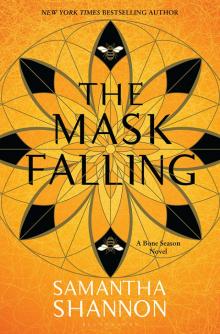- Home
- Samantha Shannon
The Priory of the Orange Tree Page 6
The Priory of the Orange Tree Read online
Page 6
For queen and country.
The note had been jerked out of his hands within moments, and presumably carried off to be burned.
What Loth could not work out was why. Why he, of all people, was being sent to Yscalin. Inys needed to know what was happening in Cárscaro, but he was no spy.
The hound of despair was on his back, but he could not let it buckle him. He was not alone.
“Kit,” he said, “forgive me. You have been forced to join me in my exile, and I have been poor company.”
“Don’t you dare apologize. I’ve always rather fancied an adventure.” Kit smoothed back his flaxen curls with both hands. “Since you’re finally talking, though, we ought to speak about our . . . situation.”
“Don’t. Not now, Kit. It’s done.”
“You must not think Queen Sabran ordered your banishment,” Kit said firmly. “I tell you, this was arranged without her knowledge. Combe will have told her you left court of your own free will, and she will have doubts about her spymaster. You must tell her the truth,” he urged. “Write to her. Disclose to her what they have done, and—”
“Combe reads every letter before it reaches her.”
“Could you not use some cipher?”
“No cipher is safe from the Night Hawk. There is a reason why Sabran made him her spymaster.”
“Then write to your family. Ask them for their help.”
“They will not be granted an audience with Sabran unless they go through Combe. Even if they are,” Loth said, “it will be too late for us by then. We will already be in Cárscaro.”
“They should still know where you are.” Kit shook his head. “Saint, I’m beginning to think you want to leave.”
“If the Dukes Spiritual believe I am the best person to find out what has transpired in Yscalin, then perhaps I am.”
“Oh, come, Loth. You know why this is happening. Everyone tried to warn you.”
Loth waited, brow furrowed. With a sigh, Kit drained his tankard and leaned in closer.
“Queen Sabran is not yet married,” he murmured. Loth tensed. “If the Dukes Spiritual favor a foreign match for her, your presence at her side . . . well, it complicates things.”
“You know Sab and I have never—”
“What I know is less important than what the world sees,” Kit said. “Allow me to indulge in a little allegory. Art. Art is not one great act of creation, but many small ones. When you read one of my poems, you fail to see the weeks of careful work it took me to build it—the thinking, the scratched-out words, the pages I burned in disgust. All you see, in the end, is what I want you to see. Such is politics.”
Loth puckered his brow.
“To ensure an heir, the Dukes Spiritual must paint a certain picture of the Inysh court and its eligible queen,” Kit said. “If they believed your intimacy with Queen Sabran would spoil that picture—dissuade foreign suitors—it would explain why they chose you for this particular diplomatic mission. They needed you gone, so they . . . painted you out.”
Another silence fell. Loth clasped his ring-laden fingers and set his brow against them.
He was such a fool.
“Now, if my feeling is correct, the good news is that we may be allowed to sneak back to court once Queen Sabran is married,” Kit said. “I say we weather the next few weeks, find poor old Prince Wilstan if we can possibly manage it, then return to Inys by whatever means needful. Combe will not stop us. Not once he has what he wants.”
“You forget that if we return, we will be able to expose his scheming to Sabran. He would have considered that. We will not get near the palace gates.”
“We will write to His Grace beforehand. Make him some offer. Our silence in exchange for him leaving us in peace.”
“I cannot be silent about this,” Loth bit out. “Sab must know if her Virtues Council machinates behind her back. Combe knows I will tell her. Trust me, Kit—he means for us to be in Cárscaro for good. His eyes in the most dangerous court in the West.”
“Damn him. We will find a way home,” Kit said. “Does the Saint not promise that all of us will?”
Loth drained his tankard.
“You can be very wise, my friend.” With a sigh, he added, “I can only imagine how Margret must feel at this moment. She may have to inherit Goldenbirch.”
“Meg must not burden that brilliant mind of hers. Goldenbirch will not need her as heir, because we will be back in Inys before you know it. This mission may not seem survivable,” Kit said, back to his jocular self, “but you never know. We may return from it as princes of the world.”
“I never thought you would have more faith than I do.” Loth took in a deep breath through his nose. “Let us rouse the driver. We have tarried here for long enough.”
5
East
The new soldiers of the High Sea Guard had been allowed to spend their last hours in Cape Hisan in whatever way they chose. Most of them had gone to bid farewell to friends. At the ninth hour of night, they would set off by palanquin to the capital.
The scholars had already left on the ship to Feather Island. Ishari had not stood on deck with the others to watch Seiiki disappear.
They had been close for years. Tané had nursed Ishari through a fever that had almost killed her. Ishari had been like a sister when Tané first bled, showing her how to make plugs out of paper. Now they might never see each other again. If only Ishari had studied harder—given more of herself to her training—they could have been riders together.
For now, Tané had to turn her mind toward another friend. She kept her head down as she wove through the clamor of Cape Hisan, where dancers and drummers were out to celebrate Choosing Day. Children skipped past, laughing, painted kites flying above them.
The streets heaved with people. They mopped at their faces with flat-woven linen. As Tané dodged merchants peddling trinkets, she breathed in the spice of incense, the scent of rain on sweat on skin, and the waft of sea-fresh fish. She listened to the tinsmiths and traders calling out and the gasps of delight as a tiny yellow bird warbled a song.
This might be the last time she walked in Cape Hisan, the only city she had ever known.
It had always been a risk to come here. The city was a dangerous place, where apprentices might be tempted to act in ways that would corrupt them. There were brothels and taverns, card games and cockfights, recruiters sent to press them into piracy. Tané had often wondered if the Houses of Learning had been built so close to all this as a test of will.
When she reached the inn, she let out her breath. There were no sentinels.
“Excuse me,” she called through the bars.
A tiny girl came to the gate. When she saw Tané, and the blue tunic of the High Sea Guard, the child knelt at once and set her forehead between her hands.
“I am looking for the honorable Susa,” Tané said gently. “Would you fetch her for me?”
The girl scurried back into the inn.
Nobody had ever bowed to Tané that way. She had been born in the impoverished village of Ampiki, on the southern tip of Seiiki, to a family of fisherfolk. One crisp winter day, a fire had sparked in the nearby forest and swallowed almost every house.
Tané had no memory of her parents. She had only avoided sharing their death because she had chased a butterfly out of the house, to the sea. Most foundlings and orphans washed up in the land army, but the butterfly had been interpreted by a holy woman as intervention from the gods, and it was decided that Tané must be trained as a rider.
Susa came to the gate in a robe of white silk, richly broidered. Her hair poured loose over her shoulders.
“Tané.” She slid the gate aside. “We must speak.”
Tané recognized the notch in her brow. They slipped into the alley beside the house, where Susa opened her umbrella and held it over them both.
“He is gone.”
Tané wet her lips. “The outsider?”
“Yes.” Susa looked nervous. She was never nervous.
“There was gossip in the market earlier. A pirate ship was sighted off the coast of Cape Hisan. The sentinels looked all over the city for smuggled freight, but when they left, they had found nothing.”
“They searched in Orisima,” Tané realized, and Susa nodded. “Did they find the outsider?”
“No. But there is nowhere to hide there.” Susa glanced toward the street, her eyes reflecting its lanternlight. “He must have escaped while the sentinels were distracted.”
“No one could cross the bridge without the sentinels noticing. He must still be there.”
“The man must be half ghost if he can hide himself so well.” Susa tightened her grip on the umbrella. “Tané, do you think we should still tell the honored Governor about him?”
Tané had been asking herself the same question ever since the ceremony.
“I told Roos we would collect him, but . . . perhaps if he stays hidden in Orisima, he will be able to avoid the sword and slip away on the next ship back to Mentendon,” Susa went on. “They might mistake him for a legal settler. He was no older than us, Tané, and perhaps not here by choice. I have no desire to condemn him to death.”
“Then let us not. Let him make his own way.”
“What of the red sickness?”
“He had none of the signs. And if he is still in Orisima—and I cannot think it otherwise—the sickness cannot go far.” Tané spoke quietly. “Further association with him is too much of a risk, Susa. You took him somewhere safe. What happens now is up to him.”
“But if they find him, will he not tell them about us?” Susa whispered.
“Who would believe him?”
Susa took a deep breath, and her shoulders dropped. She looked Tané up and down.
“It seems all of the risk was worthwhile.” Her smile made her eyes sparkle. “Was Choosing Day everything you imagined?”
The need to talk had been welling up for hours. “And more. The dragons were so beautiful,” Tané said. “Did you see them?”
“No. I was asleep,” Susa admitted. She must have been awake all night. “How many riders will there be this year?”
“Twelve. The honored Unceasing Emperor has sent two great warriors to raise our numbers.”
“I have never seen a Lacustrine dragon. Are they very different to ours?”
“They have thicker bodies, and one more toe. It would be a privilege to ride with any of them.” Tané pressed closer under the umbrella. “I must be a rider, Susa. I feel guilty for wanting so much when I have already received so many blessings, but—”
“It has been your dream since you were a child. You have ambition, Tané. Never apologize for that.” Susa paused. “Are you afraid?”
“Of course.”
“Good. Fear will make you fight. Don’t let a little shit like Turosa get the better of you, whoever his mother is.” Tané gave her a scolding look, but smiled. “Now, you must hurry. Remember, no matter how far from Cape Hisan you fly, I will always be your friend.”
“And I yours.”
The gate to the inn slid open, making them both start. “Susa,” the girl called. “You need to come inside now.”
Susa glanced toward the house. “I must go.” She looked back at Tané, hesitated. “Will they let me write to you?”
“They must.” Tané had never known any commoner to maintain a friendship with a sea guardian, but she prayed they would be the exception. “Please, Susa, be careful.”
“Always.” Her smile quivered. “You won’t miss me so much. When you soar above the clouds, we will all seem very small down here.”
“Wherever I am,” Tané said, “I am with you.”
Susa had risked everything for a dream that was not hers. That sort of friendship was something not found more than once in a lifetime. Some might not find it at all.
The space between them was fraught with memory, and their faces were no longer damp only from rain. Perhaps Tané would return to Cape Hisan to guard the eastern coast, or perhaps Susa could visit her, but for once in her life, nothing was certain. Their paths were about to pull apart, and unless the dragon willed it, they might never meet again.
“If anything happens—if anyone names you in relation to the outsider—come with all speed to Ginura,” Tané said softly. “Come and find me, Susa. I will always keep you safe.”
In a cramped excuse for a workroom in Orisima, a lantern guttered as Niclays Roos held a phial into its light. The stained label read KIDNEY ORE. It was all he could do to keep Sulyard from his mind, but the surest way to manage it was to lose himself in his great work.
Not that he was getting much work done, great or otherwise. He was perilously low on ingredients, and his alchemical equipment was as old as he was, but he wanted one more stab at this before he wrote yet again for supplies. The Governor of Cape Hisan was sympathetic, but often checked in his generosity by the Warlord, who seemed to know everything that happened in Seiiki.
The Warlord was almost mythical. His family had taken power after the imperial House of Noziken had been destroyed in the Great Sorrow. All Niclays really knew about the man was that he lived in a castle in Ginura. Every year, the Viceroy of Orisima would be taken there in a locked palanquin to pay tribute, offer gifts from Mentendon, and receive gifts in return.
Niclays was the only person in the trading post who had never been invited to join her on the journey. His fellow Ments were civil to his face, but unlike the rest of them, he was here because he was in exile. The fact that none of them knew why did not endear them to him.
Sometimes he wanted to unmask himself, just to see their faces. To tell them that he was the alchemist who had convinced the young Queen of Inys that he could brew her an elixir of life, removing any need for marriage or an heir. That he was the wastrel who had used Berethnet money to prop up years of guesswork, experiments, and debauchery.
How horrified they would be. How scandalized by his dearth of virtue. They would have no idea that even when he had made his way to Inys ten years ago, a walking tinderbox of pain and anger, he had remained faithful, in some hidden chamber of his heart, to the tenets of alchemy. Distillation, Ceration, Sublimation—these were the only deities that he would ever praise. They would have no idea that while he had sweated at the crucible, certain he could discover a way to set a body in the prime of its youth, he had also been trying to melt the knife of grief that had been buried in his side. A knife that had finally led him away from the crucible, back to the comfort and oblivion of wine.
He had not succeeded in either venture. And for that, Sabran Berethnet had made him pay.
Not with his life. Leovart had told him he ought to be grateful for that so-called kindness from Her Enmity. No, Sabran had not taken his head—but she had taken everything else. Now he was trapped on the edge of the world, surrounded by people who despised him.
Let them whisper. If this experiment worked, they would all be knocking at his door for the elixir. Tongue pinched between his teeth, he poured the kidney ore into the crucible.
It might as well have been gunpowder. Before he knew it, the draft was seething. It bubbled over, on to the table, and belched a thunderhead of evil-smelling smoke.
Niclays peered desperately into the crucible. All that was left was a tar-black residue. With a sigh, he rubbed the soot from his eyeglasses. His creation looked more like night soil than the elixir of life.
Kidney ore was not the answer. Then again, the powder may not have been kidney ore at all. Panaya had bought it from a merchant on his behalf, and merchants were not renowned for their honesty.
The Nameless One take all of this. He would have given up on making the damned elixir if not for the fact that he had no means of escaping this island but to buy his way back to the West with it.
Of course, he had no intention of giving it to Sabran Berethnet. She could hang. But if he made it known to any ruler that he had it, they would see to it that he was brought back to Mentendon and allowed to live out the rest of his life in luxury
and wealth. And he would see to it that Sabran knew what he could do, and when she came to him, pleading for a taste of eternity, there would be no sweeter pleasure than denying it to her.
Still, he was a long way from that happy day. He needed the costly substances that long-dead Lacustrine rulers had sought to stretch their lives, like gold and orpiment and rare plants. Even though most of those rulers had poisoned themselves trying to live forever, there was a chance that their recipes for the elixir might spark a new flame of inspiration.
Time to write to Leovart yet again and ask him to flatter the Warlord with some pretty letter. Only a prince might be able to coax him into handing over his gold to be melted.
Niclays finished his cold tea, wishing it was stronger. The Viceroy of Orisima had barred him from the alehouse and limited him to two cups of wine each week. His hands had trembled for months.
They shook now, but not with the need for oblivion. There was still no sign of Triam Sulyard.
The bells clanged in the city again. The sea guardians must be on their way to the capital. The other apprentices would be packed off to Feather Island, a high isle in the Sundance Sea, where all known wisdom about dragonkind was stored. Niclays had written to the Governor of Cape Hisan several times, requesting permission to travel there, but had always been rebuffed. Feather Island was not for outsiders.
Dragons might yet be the key to his work. They could live for thousands of years. Something in their bodies must allow them to keep renewing themselves.
They were not what they had once been. In Eastern legend, dragons had possessed mystical abilities, like shape-shifting and dream-making. The last time they had exhibited these powers was in the years following the end of the Great Sorrow. That night, a comet had crossed the sky, and while wyrms the world over had fallen into a stonelike sleep, the Eastern dragons had found themselves stronger than they had been in centuries.
Now their powers had dwindled again. And yet they lived on. The elixir incarnate.
Not that the theory would help Niclays much. On the contrary, the realization had driven his work into a dead end. The islanders saw their dragons as sacred. Consequently, trade in any substance from their bodies was outlawed on pain of a particularly slow and hideous death. Only pirates risked it.

 The Priory of the Orange Tree
The Priory of the Orange Tree The Dawn Chorus
The Dawn Chorus The Mask Falling
The Mask Falling The Bone Season
The Bone Season The Mime Order
The Mime Order The Song Rising
The Song Rising The Pale Dreamer
The Pale Dreamer